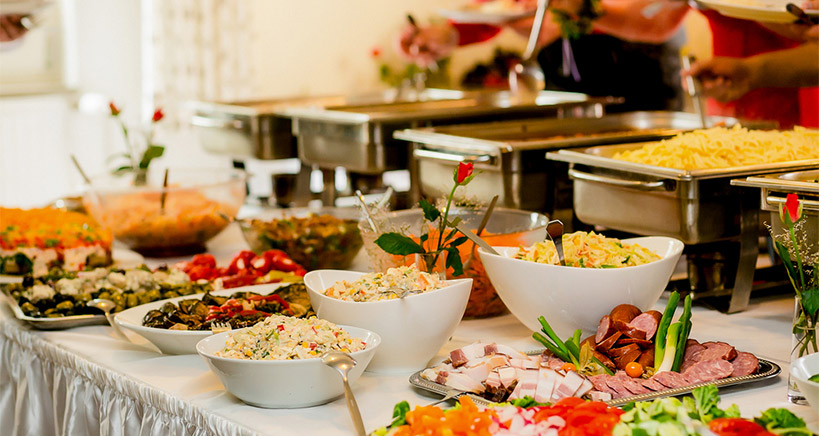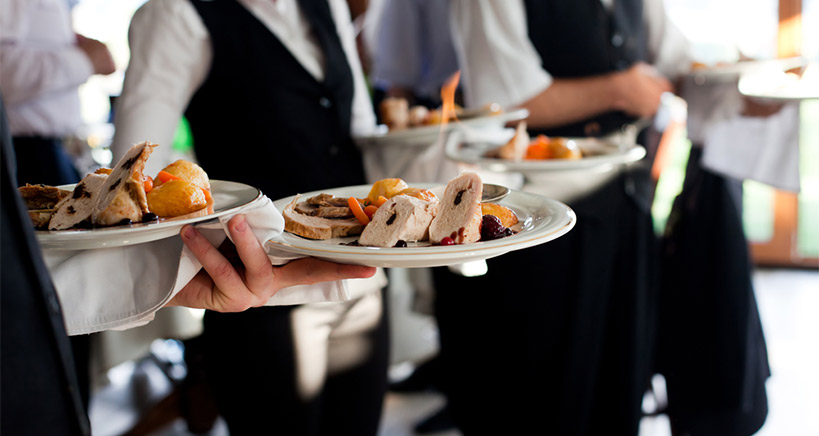
Effective Catering Contracting
Catering is a challenging business. Running a successful and busy catering business is akin to juggling and keeping a lot of balls in the air: finding and keeping dependable labor; contending with ever-rising food costs; and fighting the competition in a marketplace that is close to saturated. We gave you advice about starting a catering business and we hope you’re making a go of it. Now we’re going to explore an often overlooked area of catering – the contract, without which every job can become way more trouble than it’s worth.
Clients Come in All Shapes and Sizes
Caterers have to be great cooks, shrewd business people, skilled diplomats, and sympathetic listeners, as they deal with clients who are faced with what is usually a major event in their lives. Most of these people will be reasonable and pleasant clients who are good to work with and who are happy with the result. However, along the way, you may also meet difficult and indecisive customers who cancel events with no warning; are argumentative and penny-pinching; who fight about every dime and nickel when it comes time to paying the bill; who are demanding, who expect an instant response whenever they try to contact you; and capricious patrons who change plans on a whim. These types of customers are part of the challenge of running a busy catering company, which is why caterers need two things to succeed: a thick skin and an iron-clad written contract.
A Catering Contract is Your Protection
While it’s true that a catering contract lists the food and beverages that will be served at an event, and discusses décor and other details, more importantly, it is a legal and binding document that details the service expectations between caterer and client. A well-written catering contract gives a clear outline of the obligations, timelines, and payment schedules for both sides entering the agreement. It should include the client’s expectations regarding the food service, delivery dates, and menu; and your expectations related to fees and payments. A good contract protects both parties in case something goes awry, and it is an indispensable part of doing business as a caterer.
Focus on the Details
Although a catering contract is a legal document, you don’t have to pay a fortune to have a lawyer draft one up. There are plenty of sites on the Internet that offer handy templates, one of which – or a combination of a few – is sure to suit your needs.
All contracts start with basic information about the client: name, address, phone number, and email address. Fill in the date and location of the event, along with the start and finish times. The expected number of guests is another critical piece of information, along with other vendors the client plans on using, such as a band, photographer, florist, etc.
Don’t overlook the details of the menu itself, including key ingredients, substitutions for menu items, and whether there will be any special menu accommodations for guests who are, for example, vegetarians, have allergies, or for children. There should also be a clause about what to do with leftover food, including unopened bottles of liquor (sometimes referred to as a buyback policy).

The contract should state whether it will be the caterer or the client who will supply tables, chairs, linens, dinnerware, glassware, and silverware. If it is the caterer, list the costs related to these rentals. Make it clear as to who is responsible for deliveries, set-up, clean-up, and return of equipment. Although the name of the person who will be overseeing the staff may not be known at the time the contract is signed, a clause should be included stipulating that you will provide the information as soon as you know it, along with contact information. Also, discuss and include any proper dress code requirements for staff members.
Then There’s the Money
Since money is invariably the bone of contention in contractual disagreements, your contract should be as detailed as possible regarding finances and services rendered. Include a detailed cost breakdown of food and other services that you will be providing. This should include the number of staff members per guests; the menu and type of service – either butler-style or buffet style. Some people mix it up with buffet style for the hors d’oeuvres and then a sit-down dinner with waiter service, or visa-versa. Know your style and then detail the hourly rate per staff; the type of beverages to be served (also important is if there will be a bar), and any overtime charges. List the charge for additional guests (and be sure to mention when a final number must be submitted), and discuss the charge for extras that might be added, that are not included in the base price.
Then do the calculations to estimate the total cost of the event, including taxes and tips.
Once the client looks at the bottom line – turns red, gasps, and swallows – make sure you point out the clause that includes the payment schedule. It is acceptable in the catering field to require a down payment (also called a retainer) to cover initial food costs and seal the agreement. In addition, the date of the penultimate payment – based on the estimate and not including extras – should be specified (it is usually a few days before the event). Equally important is to mention a date for the final payment, which is either immediately following the event or a day or two later. This last payment will include things like extra guests, breakage, overtime, and so on. The contract should clearly state your policy regarding the forms of payment that you accept, such as cash, checks, credit card, etc.

Prepare for Every Eventuality
Only the most innocent caterer believes that clients won’t make changes to menus or other details relating to the catering service. In the interest of client satisfaction, a good caterer should know how to be understanding and how to accommodate changes. However, there should be a limit to your understanding; at some point, you will have to seal your plans and commit to vendors ahead of an event. Therefore, it is essential that you include a cut-off date for changes in the contract, as failure to do so will wreak havoc in the days leading up to the event.
Despite every effort to cover all the details involved in a catered event, things can happen unexpectedly. For this reason, there must be a section in the contract devoted to the terms and conditions that relate to refunds in case of the cancellation of the agreement. Although the contract is legally binding, there must be clauses that allow the client to sever it should the need arise, and these sections should protect both the caterer and the client from ongoing liability and fees. Outline the terms related to refunding the down payment and detail any additional charges involved in breaking the catering contract. The cancellation and refund policy can be flexible, depending on how far in advance the cancellation is made. If a client cancels three or four months in advance, for instance, a caterer still has a good chance of rebooking the date, so a larger refund can be given than if the client cancels only a week or two (or less!) before the reserved date.
The Caterer-Client Relationship
The caterer-client relationship is like a marriage; therefore, the catering contract must include steps that must be taken in case of divorce, i.e., breach of contract. Before either party signs the contract, both sides should understand who is responsible for lawyers’ fees in the event of a lawsuit. Include an option to seek mediation for conflict resolution, as that could represent a big savings on onerous legal fees.

Sometimes caterers really hit it off with their clients and a bond is formed at the very first meeting. That’s great, especially if that special rapport holds up through the event itself. Nonetheless, don’t give in to an urge to draft a friendly, casual agreement. When large amounts of money and time are on the line, you have to ensure that you will be paid for food and services in a proper and timely manner.
Why the Catering Contract is So Important
The key to contracting is to define the expectations of all the parties involved. By clearly outlining the caterer’s and the client’s responsibilities, a good contract eliminates ambiguity, which in turns helps to avoid disputes. Catered events can be stressful for everyone, but if you start off with a good contract, customized to yours and your clients needs, you will be on the right track to success.
So it’s 30 days before event. Their head count changes and client only wants to pay per head count . How do you handle refund or last final payment less then you originally calculated.
This is a good post. I’m definitely going to look into it.Really very useful tips are provided here.thank you so much.Keep up the good works.
Good article, well thought our points and things new caterers should be reminded of. Thanks for trying to help keep caterers and clients a little bit safer.
You have a client for wedding event in sometime of Nov. 2020. Due to covid 19, they are requesting to refund the reservation fee. Does it follow the rule for Non-refundable RF? Given the pandemic situation, does it still cover the month of Nov. 2020? Please advise. TIA
Thank you for the guidance
Do advise if your firm handles breach of contract / business litigation cases.
It’s good to see that you wrote so much about catering service. Very informative as well as useful for many others. Appreciate it